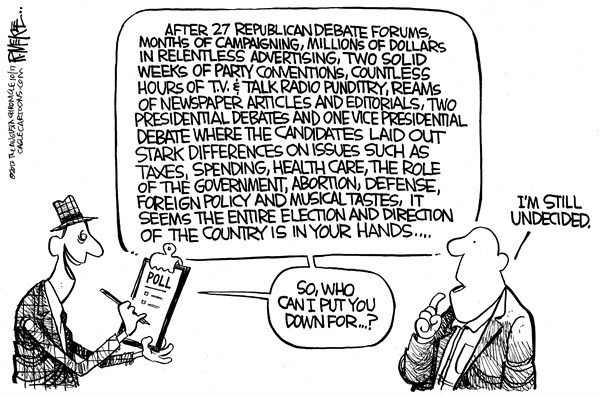The Case for Obama
It's the Economy, Energy, and Foreign Policy.

In what has become a very tight presidential race I’ve not seen any clear and concise case made for re-electing President Obama. When I voted for Obama in 2008 I did so with reservations which have been borne out and even amplified in some ways, particularly on foreign policy.
Yet, come November 6, I am voting again for Obama. Here’s why you should, too, even if you have to hold your nose.

It’s the economy, stupid: On the economy, there’s no denying we’re still in very bad shape. The debt and deficit are at record highs, unemployment is still way too high, and we continue to grow at a tepid rate below two percent – about half what is considered a normal and healthy rate.
However – and this is a big “however” – things are nowhere near as bad as the Republican opposition would have us believe. The debt and deficit are far too high, but the number that really matters – the amount of interest we pay on the debt – is not actually that high because interest rates are at historic lows.
Obama has re-financed all the federal debt and we now pay about half what we paid on interest in the 1990s, when we calculate what really matters: the percentage of the U.S. economy spent on interest payments. So even though the debt is way higher than it used to be, the cost of our $16 trillion national debt is actually far less than it was in the 1990s under Bush and Clinton when it was less than $6 trillion. And it will stay low for a while because interest rates will stay low.
It’s also important to point out that Obama has succeeded in bringing Bush’s 2009 deficit (the budget was set by Bush in 2008 before Obama came into office) of $1.2 trillion down to $1.1 trillion for 2012. So we’re moving in the right direction.
Our present rates of growth and job creation are indeed too low, as Romney and other Obama critics charge, but we are moving in the right direction on this issue also, and have been steadily. The unemployment rate is now back to where it was when Obama came into office, at 7.8%. This figure fails to account for many Americans who are under-employed or have stopped looking for work, but, despite the criticisms by Republicans, this has been the case for decades. So there’s no subterfuge behind the Bureau of Labor Statistics (BLS) unemployment rate numbers.
(The idea that BLS and the White House have somehow collaborated to cook the numbers to bring the rate below 8% before the election, as suggested by General Electric’s former CEO Jack Welch, and many others on the right, strikes me as absurd).
More generally, the United States is doing quite well in relation to other developed nations. A recent report from the Financial Times and the Brookings Institution stated that the United States is “the sole bright spot” in the global economy in terms of our current economy and our prospects for growth. So while the economic situation needs a heckuva lot of improvement still, we are not as bad off as our peers, and that does matter for many reasons, including attracting investment, maintaining a strong dollar, etc.
Romney would have us adopt austerity measures to reduce the deficit and increase growth. However, a recent World Economic Outlook (produced annually by the International Monetary Fund) concluded that countries that are pursuing “austerity measures” (labeled “fiscal consolidation” in the report), that is, cutting budgets rather than pursuing stimulative fiscal policy, are doing worse than nations that are not pursuing austerity measures.
This is a strong empirical repudiation of the austerity approach to growth, which has long been part of the “Washington consensus” regarding international development. That consensus is now changing, as many nations realize that while debt is a very serious problem that can’t be ignored, pursuing austerity measures to reduce debt is the wrong approach while the economy is still struggling – the opposite of what is needed, in fact.
Last, taking a historical view, Bill Clinton was right: the U.S. economy really does do measurably better under Democratic presidents. Job creation and economic growth have been far better under Democrats since WWII. This doesn’t guarantee that re-electing Obama will lead to a better economy than it would under Romney, but it’s pretty good support for that conclusion. Democrats seem to be able to find a better balance between taxation and fiscal stimulation than Republicans.
The foreign policy debate: On foreign policy, I was wary of Obama before he came into office, primarily because of his stated intention to flout international law and violate Pakistani sovereignty if the United States perceived a threat in Pakistan and Pakistan failed to act on that threat. Obama actually went even further than this statement in not even asking the Pakistanis to capture Bin Laden before launching the raid into Pakistan than killed Bin Laden.
Clearly, I’m in a minority on this issue because most Americans think Obama’s killing of Bin Laden is a bright spot on his foreign policy resume. I don’t. I think it was a clear example of aggression and extra-judicial execution. But that’s because I’m a rule-of-law kind of guy. While Republicans and Democrats alike trumpet the rule of law as a clear Western value, both parties’ actions strongly belie the rhetoric, favoring instead a might-makes-right approach to foreign policy that exposes our consistent hypocrisy and damages our global standing in many ways.
My feeling is that Obama has been Bush-lite on foreign policy and he has even been more aggressive on some issues, like dramatically expanding the drone war in Pakistan, than Bush was when he left office. A recent joint Stanford and NYU Law School report estimates, contrary to the statements from the White House and other advocates of drone attacks about the accuracy and humaneness of drone strikes, that literally only 2% of drone kills are high-level targets, and that entire communities in Pakistan are being constantly terrorized by the drone presence and the constant threat of strikes. This is sickening and highly counter-productive to U.S. security.
Nevertheless, I have little doubt that Romney would be even worse on foreign policy, judging by who he’s chosen to surround himself with on foreign policy. His foreign policy advisors are uniformly neocons and Realists – the same crew who got us into the Iraq war in 2003, which was a mistake of epic proportions.
The real issue: energy The third major issue I’ll tackle is energy. This is my primary area of expertise and I believe we are in an era that demands an effort akin to that required to win World War II in order to resolve the twin threats of resource depletion (peak oil) and climate change.
Romney pooh-poohs renewable energy, conservation, and government investments in alternatives to fossil fuels. Obama has shifted his rhetoric in the last year, from a strong focus on alternatives to fossil fuels, to an “all of the above” energy strategy. He continues to support subsidies and policy support for alternative energy.
Obama is right to focus on alternatives like energy efficiency and major programs like weatherization of homes (making them more efficient for all seasons). California has long led the way on this front and even though California’s electricity rates are high, the actual power bills that homeowners and businesses pay are far lower than average because we’re far more efficient in how we use energy.
California’s per capita electricity use has stayed almost level since the mid-1970s, even while electronic gadgets have proliferated. At the same time, U.S. average per capita electricity use has climbed about 60%. If the United States as a whole became more like California on energy efficiency, we’d save billions of dollars rapidly – spurring economic growth.
Similarly, Obama is right to push for higher fuel-efficiency standards for cars. Average mileage for cars had stagnated since the 1980s. The Obama administration succeeded this year in implementing an industry-supported plan to almost double fuel efficiency by 2025, to 54.5 miles per gallon. This will save car owners buckets of money due to saved fuel costs, more than negating any increase in vehicle costs.
Obama is also a supporter of extending the production tax credit for wind power, which provides about a 30% reduction in the cost of wind power farms. Romney has stated he would scrap the credit when it expires at the end of 2012. I don’t think wind power or other renewables should receive permanent subsidies (like nuclear power), but I do support one more extension for wind power.
Solar power (photovoltaics or “PV”) is truly the next BIG THING and it is being deployed now around the world at a record pace, doubling in installed capacity every year or two. China now has over 40 gigawatts of solar PV production capacity, compared to a paltry two gigawatts for the United States, according to a recent Bloomberg New Energy Finance report. This global market could be a major economic boon for the United States, but instead we’ve ceded this market to China and other countries who were more far-sighted than us.
Romney strongly supports coal power, ignoring the highly detrimental health and environmental impacts from coal. Obama is not a big supporter of coal.
In terms of oil, U.S. production has increased remarkably under Obama, from about 5.4 million barrels per day in early 2009 to about 6.1 million barrels per day in 2012, continuing an increase that began under President Bush. This increase reversed a seemingly inexorable decline in U.S. oil production since our production peaked at about 9.6 million barrels per day in 1970. At the same time, increased production, along with reduced demand from higher energy efficiency and economic contraction, has dramatically reduced our dependence on oil imports.
I agree with Obama’s critics that he can’t really take much credit for this increased production of oil because it’s being driven primarily by market forces. In case you missed it, oil and gas prices have been at record highs for a number of years now, spurring increased drilling around the world.
At the same time, Romney’s focus on increasing U.S. production further, at the expense of alternatives, is misguided because it is incontrovertible that the long-term decline we’ve seen in U.S. oil production will continue before too long. This is due to unavoidable limits on how much oil is in the ground and the lack of any large conventional oil fields being found to replace today’s conventional oil fields.
There’s a reason companies are being forced to drill in deeper and deeper water: The easily accessible oil is long gone. Far-sighted policymakers will recognize this reality and work hard to wean us from oil – not to exacerbate our oil addiction and leave us without robust alternatives to oil when it becomes even more expensive than it is today.
In sum, Obama will be far better on energy, foreign policy, and the economy than Romney. That adds up to my vote.



